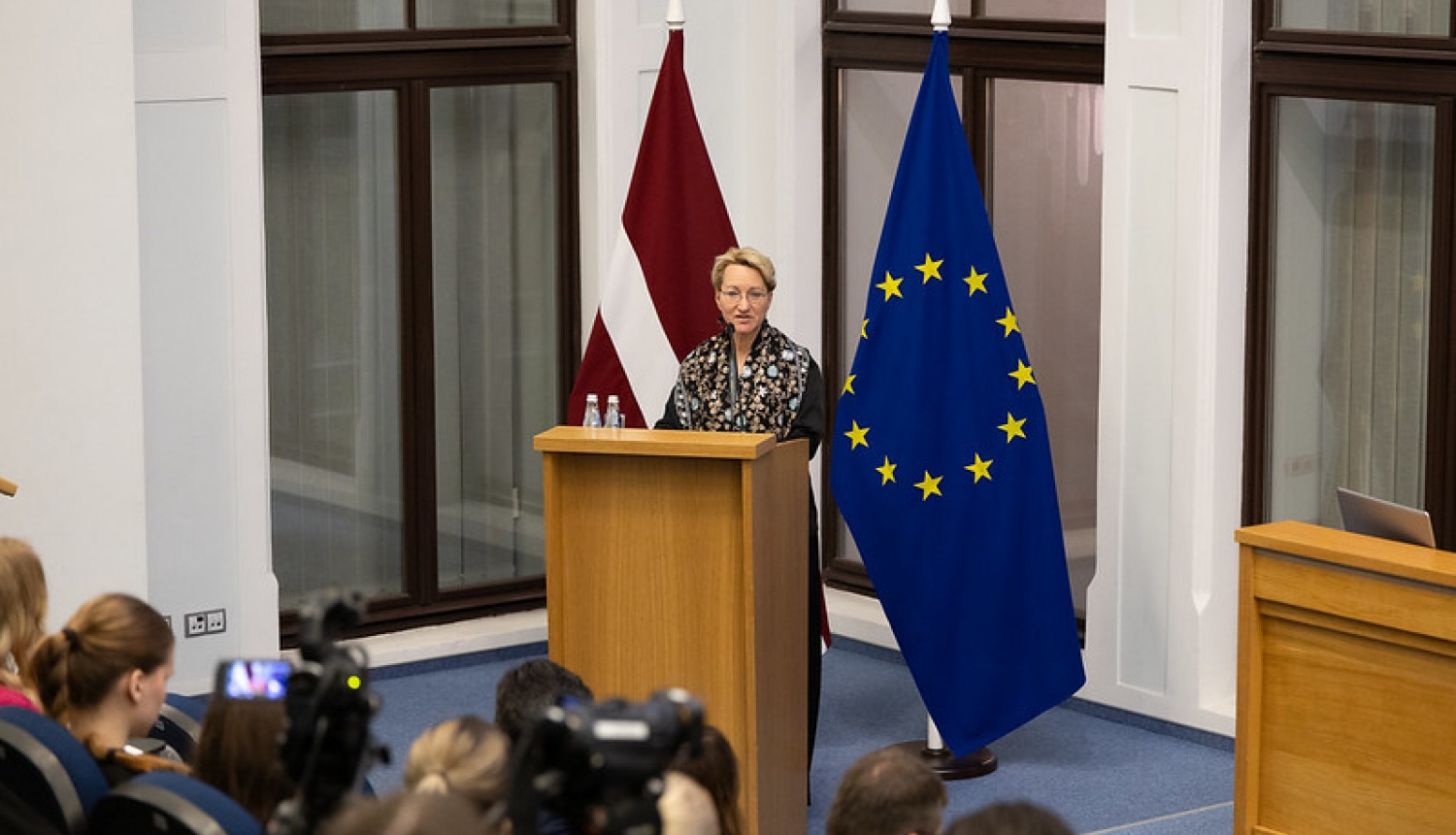“As we mark 20 years since joining the European Union, we are being increasingly aware that the EU – it is ourselves, not someone “over there in Brussels”. Namely, it depends only on ourselves how actively we represent our interests in the EU and how we use the opportunities it offers. At this point, the EU is entering a new five-year institutional cycle, and given the current geopolitical situation, we are aware that the years ahead will be crucial for the EU to be able to sustain and strengthen its global role and influence, including through improvement of living conditions for its citizens,” said the Parliamentary Secretary of the Ministry of Foreign Affairs, Dace Melbārde, in her opening remarks for the conference, “The Future of the European Union and Latvia’s Interests”.
Dace Melbārde also underlined that, over the course of two decades, Latvia has become a mature Member State and a reliable partner for its allies. She also pointed out that the future of the EU, just like the present, is full of challenges and will remain so: “Russia’s full-scale invasion of Ukraine enters its third year, which exerts a significant impact on the security and economy of both Latvia and the EU. On the other hand, an increasing global polarisation and conflicts in the Middle East and other regions of the world are also a test of EU unity.”
“Today, the EU is the largest support provider to Ukraine in its fight for freedom, democracy and a rules-based international order, and it is the responsibility of all of us to continue this support for Ukraine’s fight against aggressor while ensuring our own security needs. No doubt, NATO is our primary guarantor of security, and will remain so, while the EU can contribute by allocating funds, developing defence industry, promoting military mobility and strengthening societal resilience,” Dace Melbārde noted.
She also emphasised that Russia’s war against Ukraine has given a fresh impetus to the EU’s enlargement policy, and the world’s most successfully integrated family of nations is expected to become richer by some Member States in the foreseeable future. “We support Ukraine, Moldova, and other candidates as a matter of principle in their European integration process, bearing in mind that enlargement is, and must always remain a merit-based process. In the context of enlargement, discussions on the next EU multi-annual budget will be crucial: that is, it must be sufficient to maintain both the current level of ambition and the possibility of welcoming new Member States,” said Dace Melbārde, Parliamentary Secretary of the Ministry of Foreign Affairs.
Dace Melbārde also launched a publication, “Latvia’s Vision of EU 2030. Towards a European Union Prepared for Future Challenges”, prepared by the Latvian Institute of International Affairs with support from the Ministry of Foreign Affairs.
About the conference, “The Future of the European Union and Latvia’s Interests”
The conference, “The Future of the European Union and Latvia’s Interests”, was organised by the Ministry of Foreign Affairs and the Latvian Institute of International Affairs to mark 20 years of Latvia’s membership of the EU. The aim of the event – to stimulate a public discussion on the various challenges for the future of the EU and the role and interests of Latvia in shaping the EU’s future. The conference addressed topics such as the role of the EU in security and defence, the EU enlargement, promoting competitiveness both in Latvia and in the EU, Latvia’s progress towards climate targets, and their impact on the population and economy.
The panel discussion gathered experts in EU matters in various fields from think tanks, the media, public administration, civil society and business community. The audience – EU-related information providers, including those running the European Union Information Points (ESIP) and Europe Direct centres in Latvia’s regions, and the representatives of the academic sector, the media, civil society and youth, and other stakeholders.
Further information
- The conference agenda – The Future of the European Union and Latvia’s Interests (in Latvian)
- Latvia’s Vision of EU 2030. Towards a European Union Prepared for Future Challenges (in Latvian)
- About Latvia’s achievements and benefits in various fields over 20 years of EU membership - 20 years of Latvia's membership of the European Union | Ārlietu ministrija (mfa.gov.lv)





